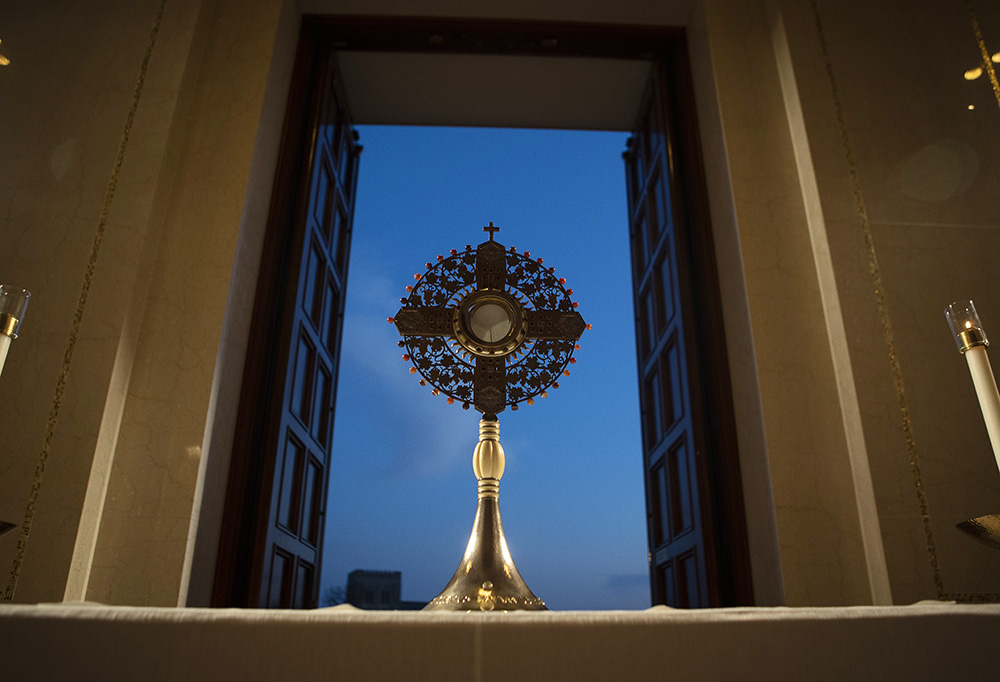
A monstrance holding the Blessed Sacrament for eucharistic adoration is seen at the Basilica of the National Shrine of the Immaculate Conception in Washington March 11, 2021, amid the coronavirus pandemic. (CNS/Tyler Orsburn)
Growing up in my small parish in Iowa, I always loved Communion — and not only because I knew that by the time Communion came around, Mass was almost over. But even when I was a kid, something within told me it was special. I would hold the host in the side of my cheek all the way back to my pew and let it dissolve, seeing how long I could make it last.
As I grew in my faith, so did my love of the Eucharist, not only in how we shared it together during Mass, but how I was likewise called to become what I had received.
So, when I heard about the National Eucharistic Revival, called for by the U.S. bishops in 2021 and culminating at Pentecost of 2025, I was curious. Was this a way to invite our communities back after worshiping virtually through a pandemic? Was this a desire to help restless hearts rest in the body of Christ? Was this a religious response to a political question?
As I've grown in my spirituality, I've become less interested in answers and my questions remained mostly just that. More urgently, at the time the revival surrounding the body of Christ was beginning in 2022, I was navigating hard decisions related to my own body.
That was when, at 42, I underwent a hysterectomy to remove my uterus and a 7-centimeter fibroid, ending pain and discomfort that were akin to being five months pregnant. I had always wanted to be a mother. I had always seen myself getting married and having children of my own. Yet, the years passed and relationships went stagnant. It just never happened.
I gave of myself in different ways as a pastoral care minister in a parish and later as a chaplain in a retirement community. I held fragile hands as their pulses faded. My hair had been bathed in nursing assistants' tears after the death of a beloved resident.
Advertisement
At the height of the coronavirus pandemic, while the world shut down and churches closed their doors, I still worshiped at many tabernacles — they just happened to look like residents' rooms. I prayed many a holy hour with the body of Christ, it simply took the form of a dying 90-year-old man.
The months and years of discernment and dialogue with my physician made me confident in my decision to have surgery. Yet losing my fertility left wounds on my body, heart, soul and mind. When I returned to Mass, I couldn't help but touch my sutures tenderly during the Liturgy of the Eucharist. When the priest held up the host and repeated the words of Jesus, I prayed with my own wounds, "This is my body, given for you." Likewise, when he held up the chalice: "This is my blood, my heart, poured out for you."
The longer I prayed with my scars, visible and invisible, the easier it was to see them in others. As a pastoral care minister and chaplain, I had learned that every person carries stories and wounds with them of which they do not speak. Now my own body had been broken open, too, and my heart and soul along with it.
I recognized the deep sigh of the cashier at the grocery store. I stopped judging the man in the median with the cardboard sign saying, "Anything helps." When a friend lost her temper, I left my defenses at the door and just listened.
Maybe it's simply a matter of increased exposure, with the constancy of news and social media, but I can't seem to go a day without hearing of another war, another atrocity against human dignity, another person receiving a cancer diagnosis or another life ended in despair. And at every one, my heart breaks.
If there was a time for a revival in the Eucharist, now is the time. If there was a time to turn toward God's incomprehensible love for us, it is now. But the needs of our neighbors and the call of our faith demand eminently more than, "thoughts and prayers."
I still worshiped at many tabernacles — they just happened to look like residents' rooms. I prayed many a holy hour with the body of Christ, it simply took the form of a dying 90-year-old man.
Pope Benedict XVI (yes, Benedict) wrote in his apostolic exhortation Sacramentum Caritatis, "The eucharistic mystery thus gives rise to a service of charity towards neighbour, which, 'consists in the very fact that, in God and with God, I love even the person whom I do not like or even know. ... Then I learn to look on this other person not simply with my eyes and my feelings, but from the perspective of Jesus Christ.' "
Dorothy Day wrote in her autobiography, "It is a terrible thought — 'we love God as much as the one we love the least.' " Frankly, it is a terrible thought. With all my years of spiritual direction, formation, therapy and theologizing, there are still people who come to mind like a sword piercing my heart when I hear Dorothy say, "We love God as much as we love the one we love the least."
It's easy to love my neighbor when they think like me, dress like me, act like me, look like me, worship like me, believe like me. Haven't hurt me. Don't inconvenience me.
But what about the ones that do? The one who is different from me? The one who has hurt me? That one who comes to mind with Dorothy Day's terrible thought? The one who has me begging, "Not them, Lord. Anyone but them. I'll work on loving anyone but that one person?"
But that's not how Christ loved. Christ loved people who were not like him. He loved people who did not look like him. He loved people who opposed him. He loved people who hurt him and his believers.
Every time we encounter the Eucharist, whether at Mass or in adoration, we are invited to encounter our brother and sister as Christ, to love them as Christ. We come in the presence of Love personified. We come in the presence of what it means to give one's whole self for another.
Long after our holy hour has ended, beyond the curbs of the church parking lot, when the host has dissolved in the side of our cheek, the Eucharist lives on in each of us. It is not just something to be contemplated, meditated or reflected on. It is a mystery to be lived.







